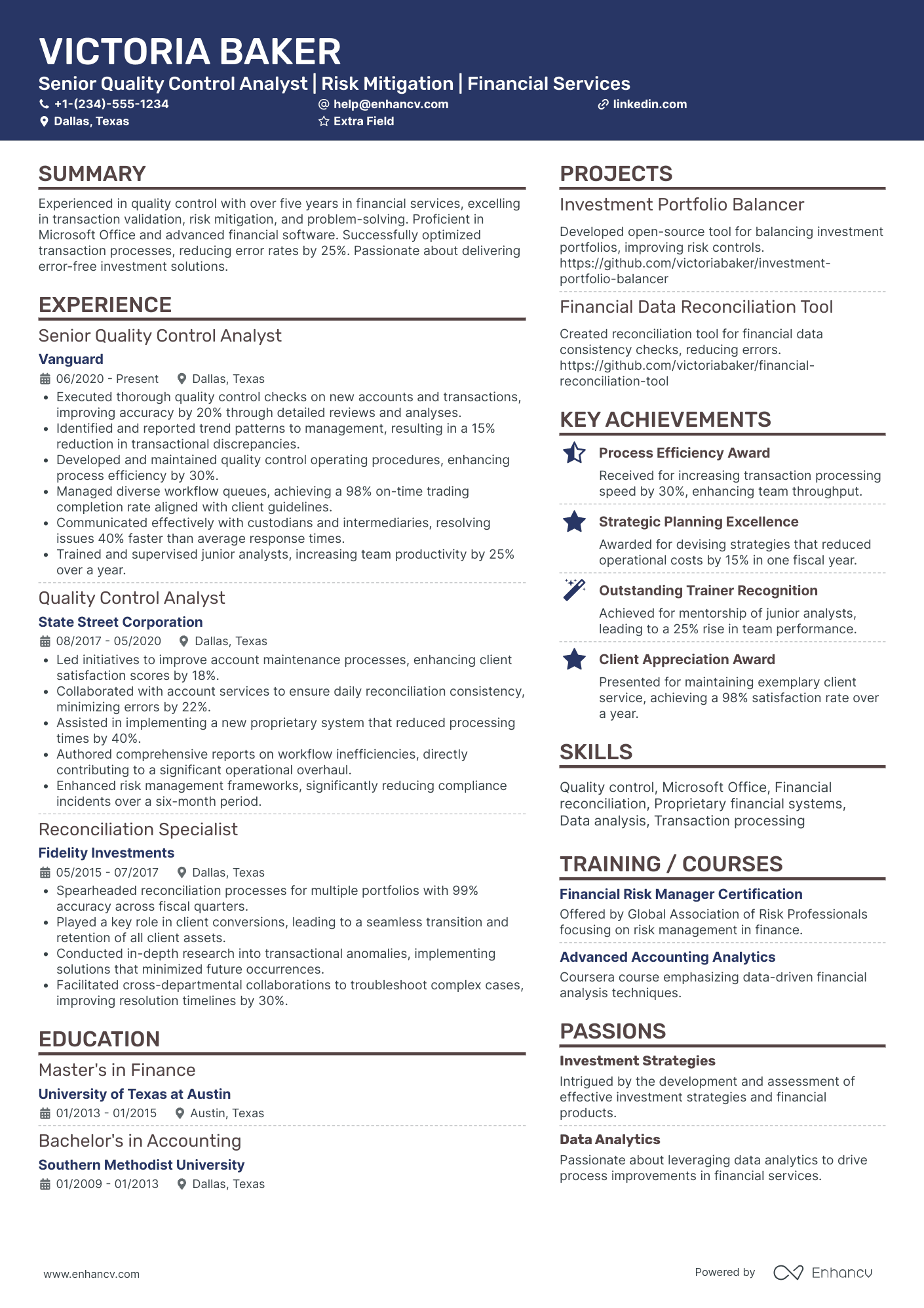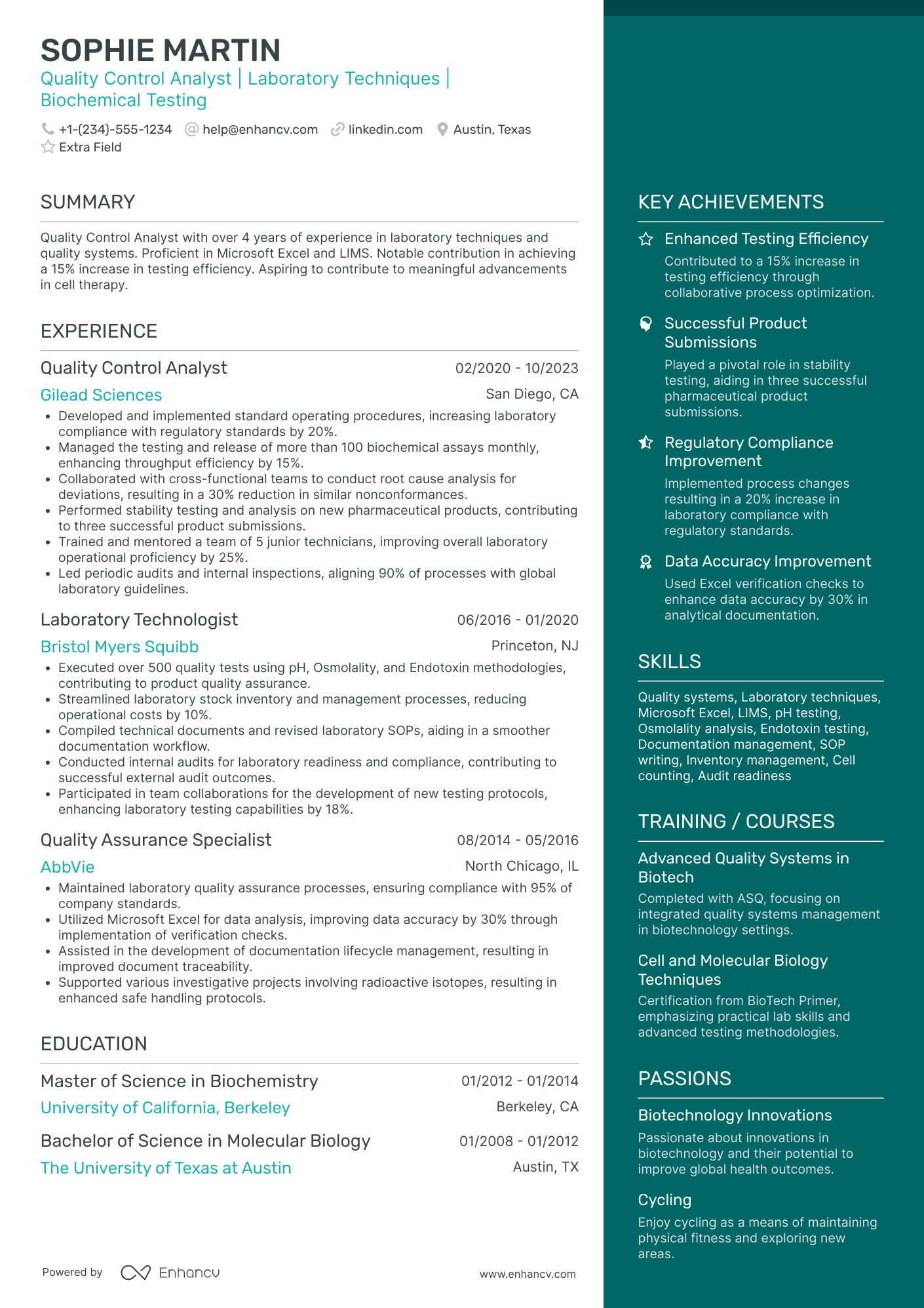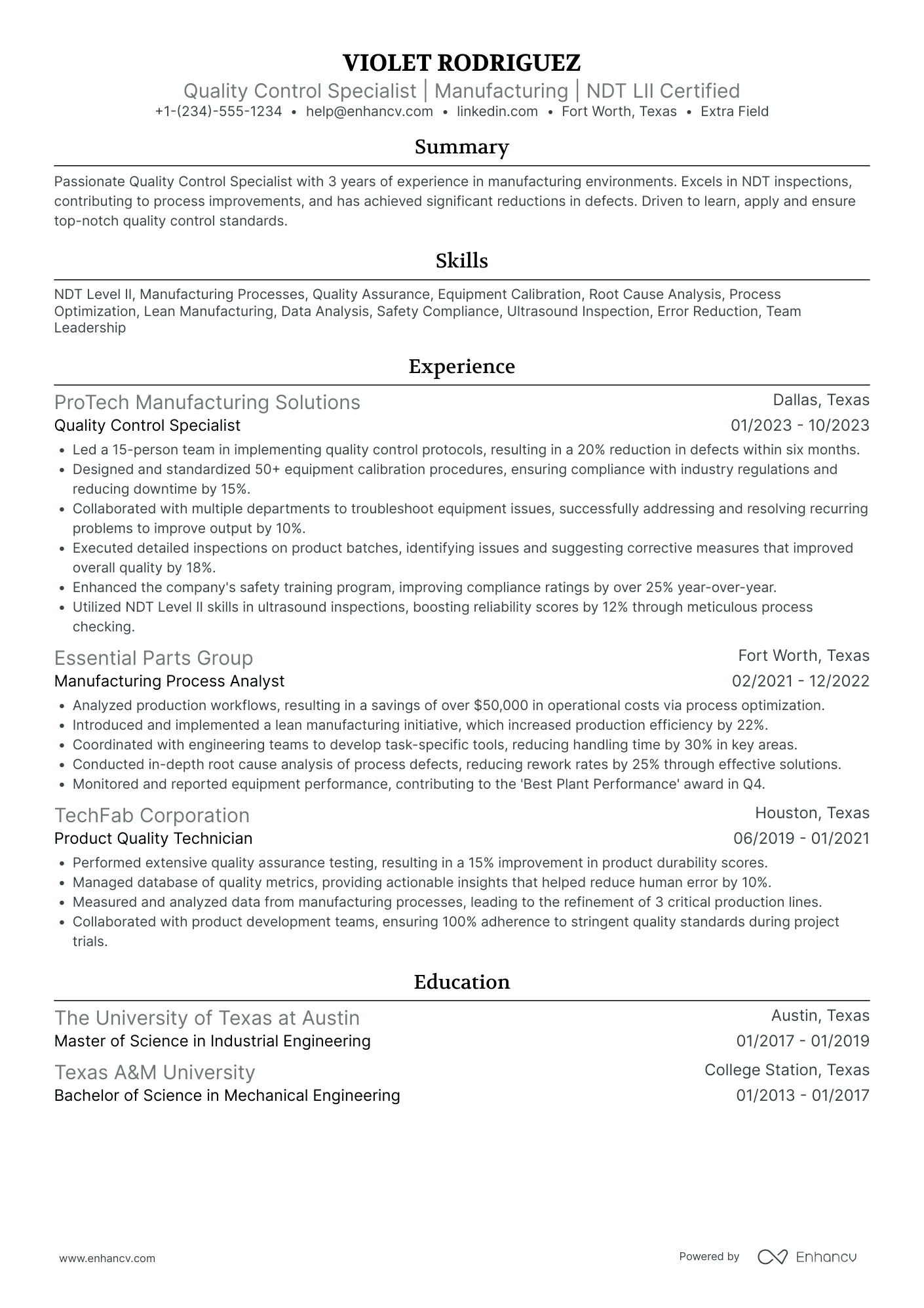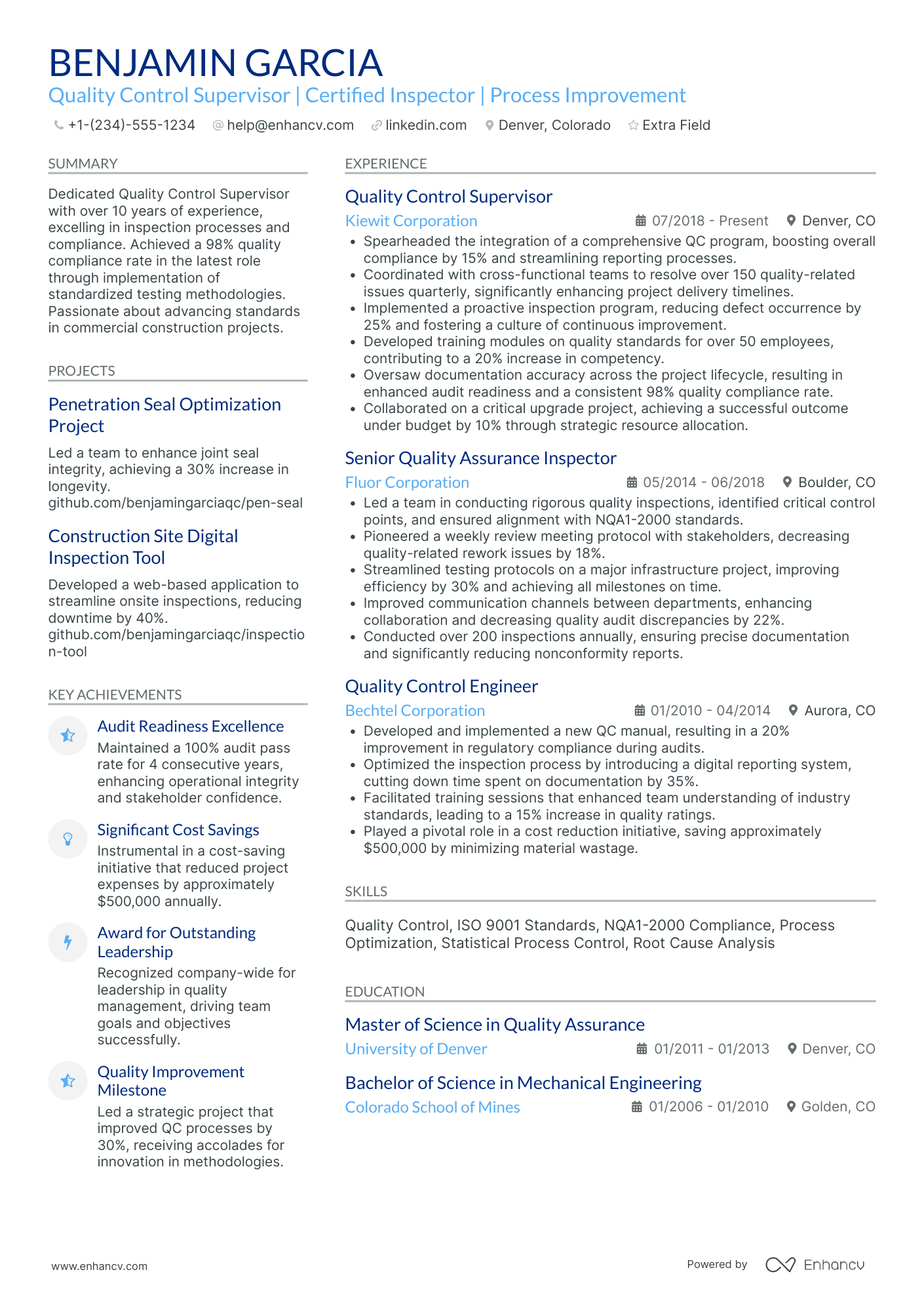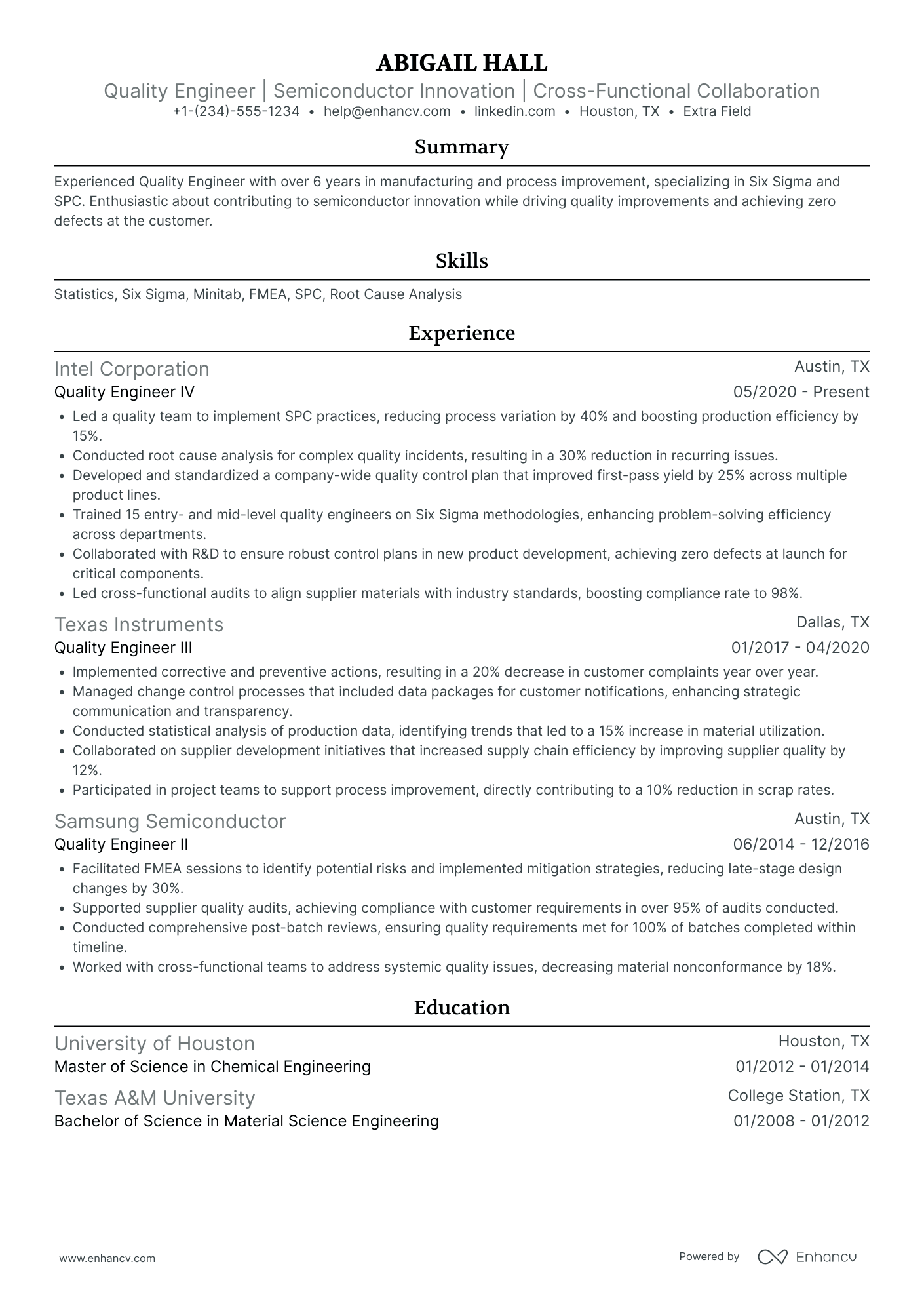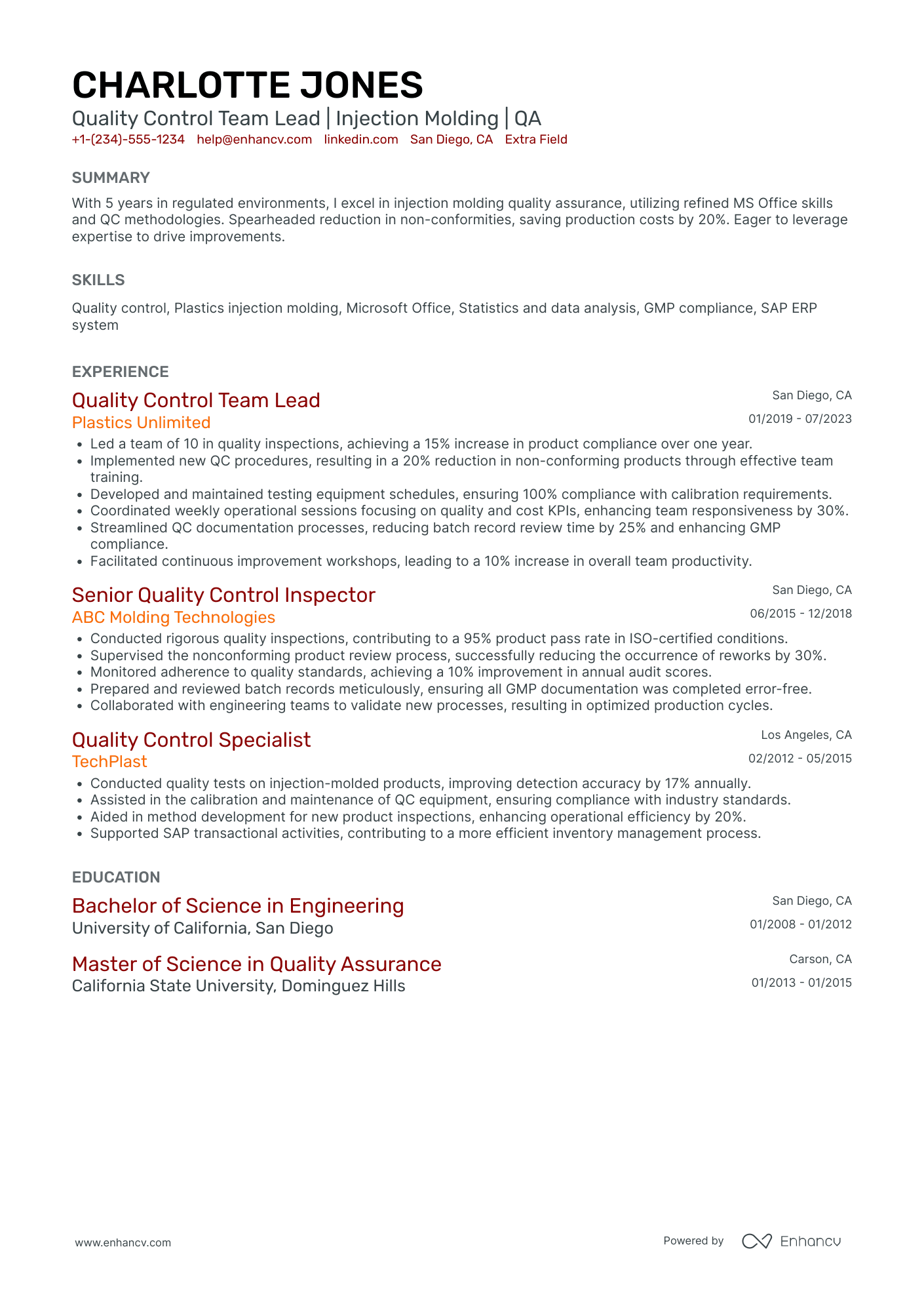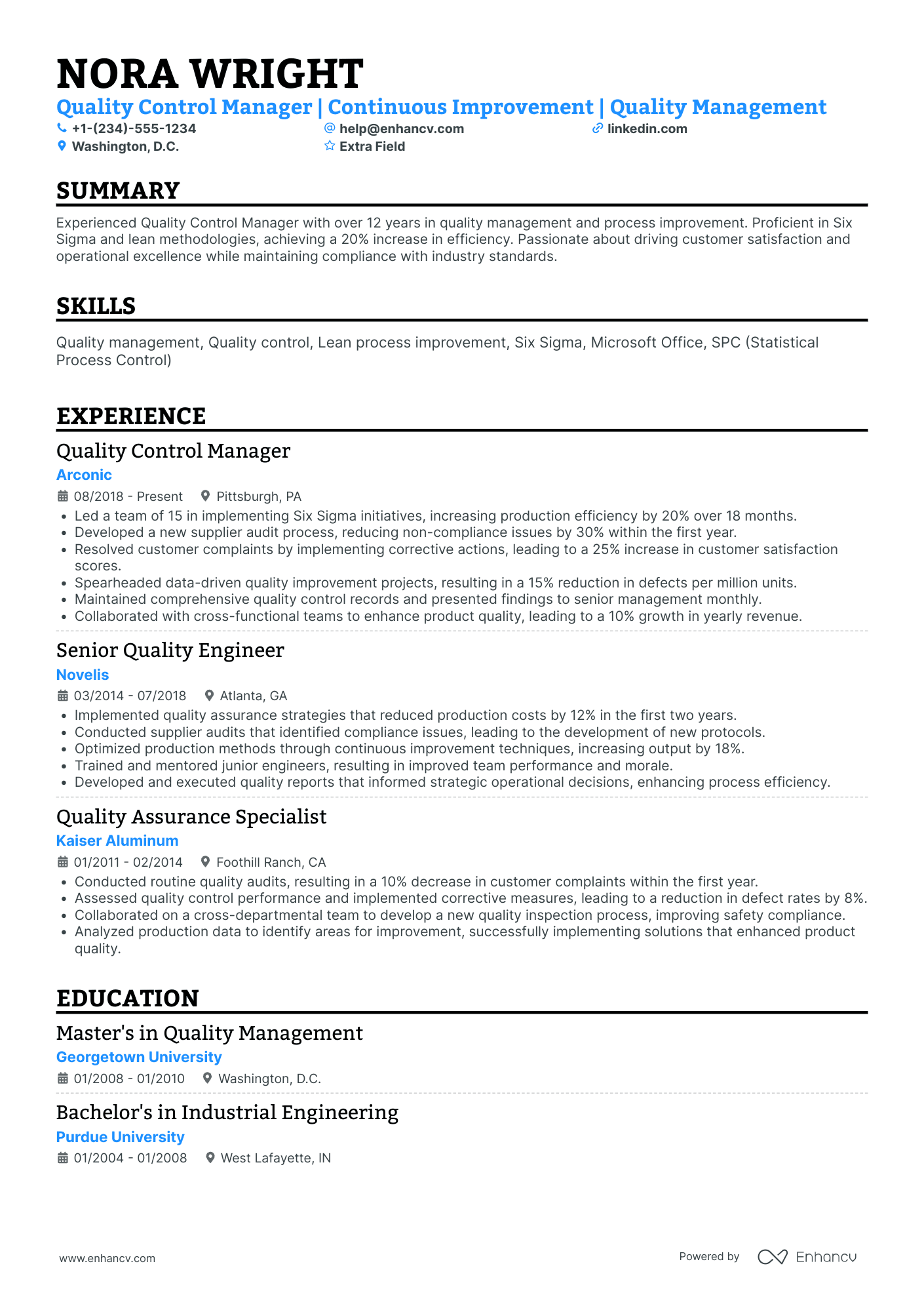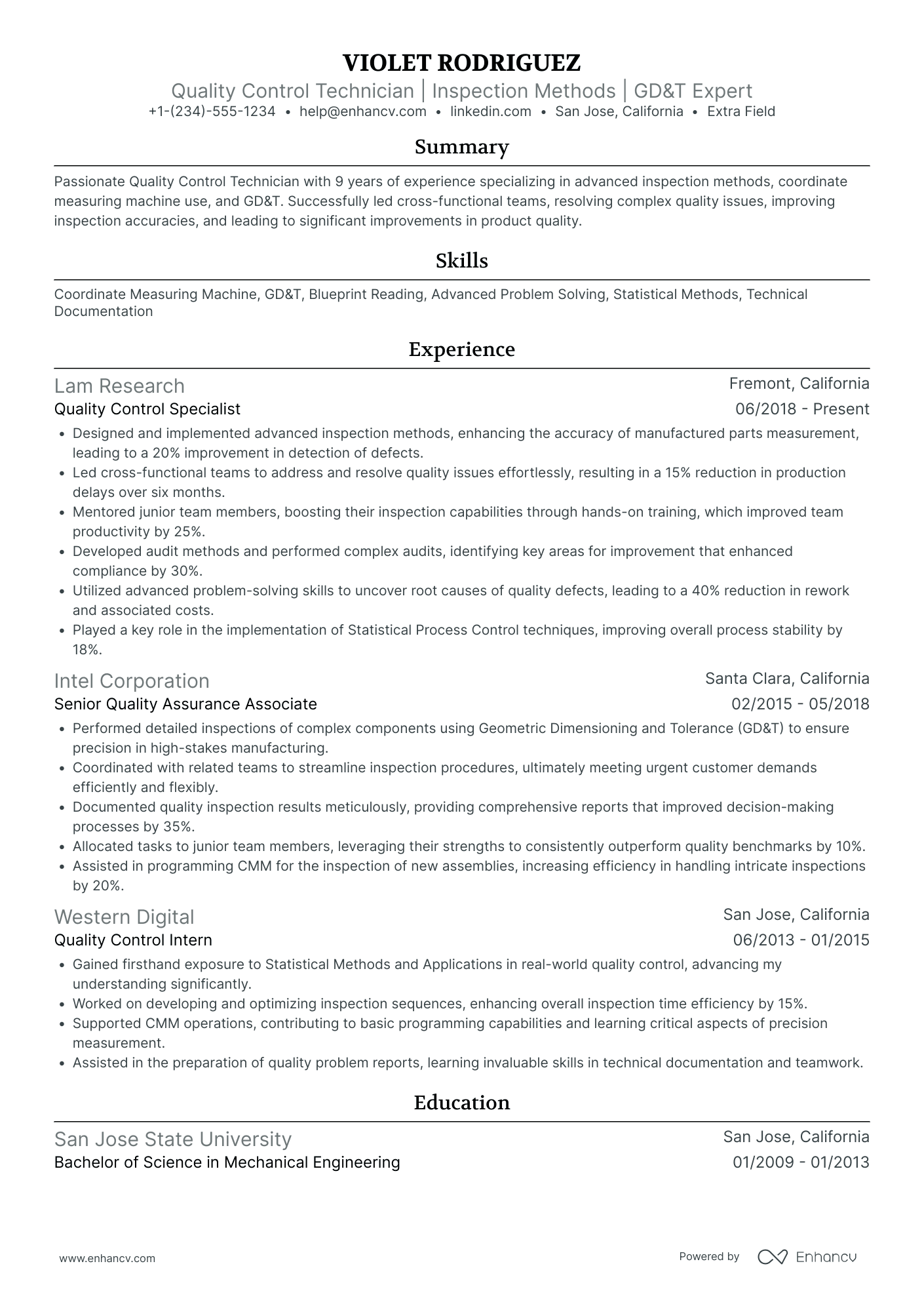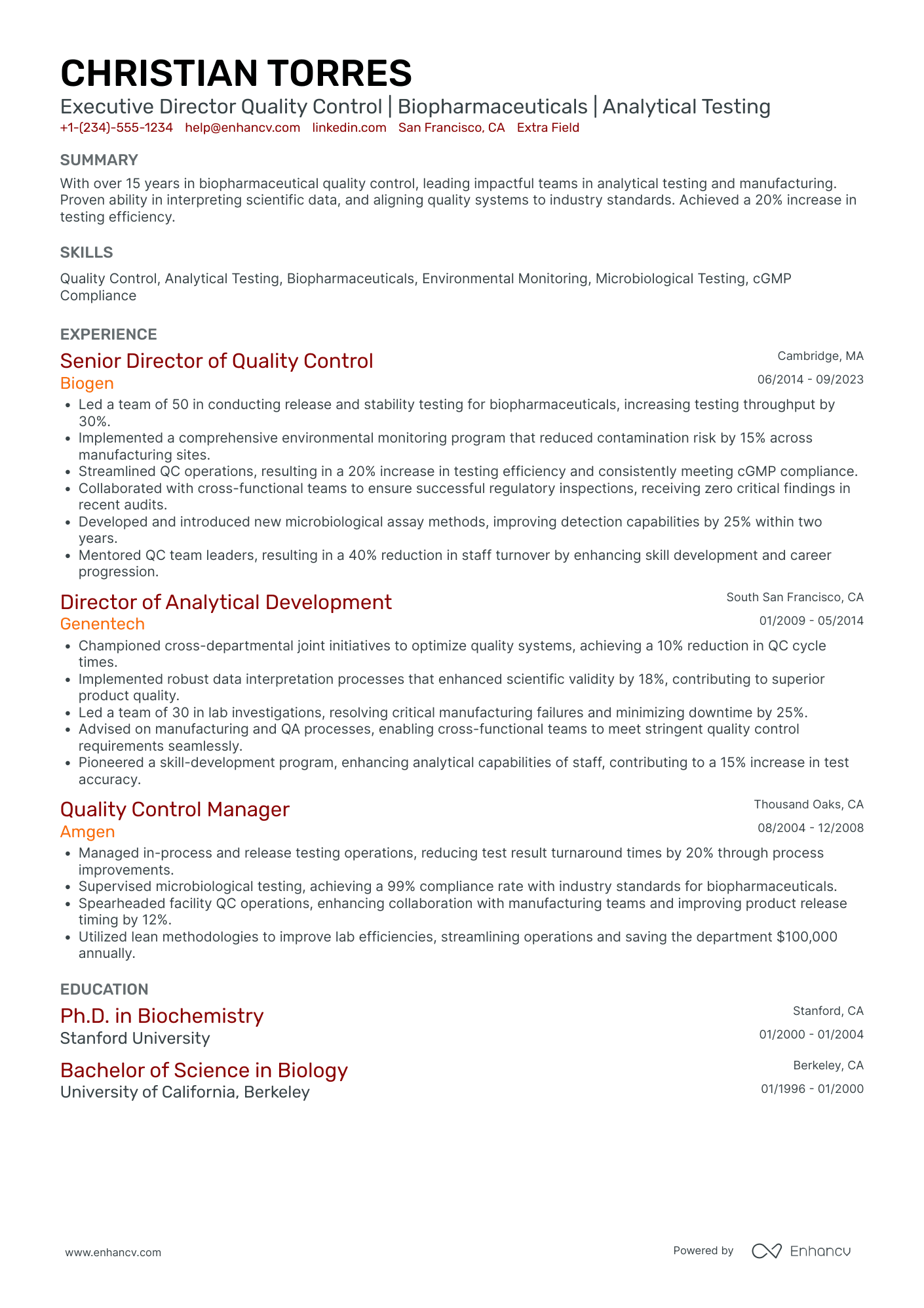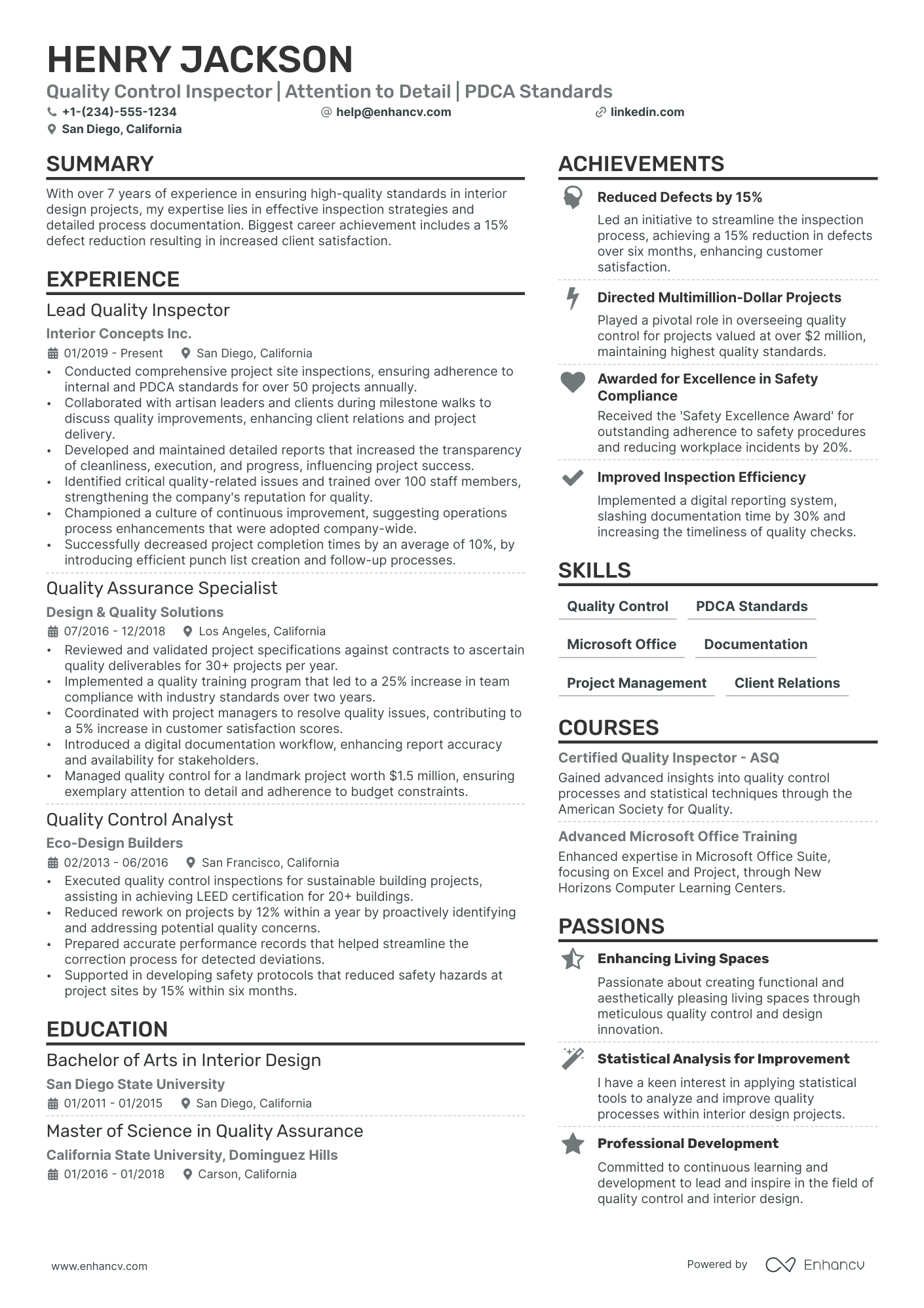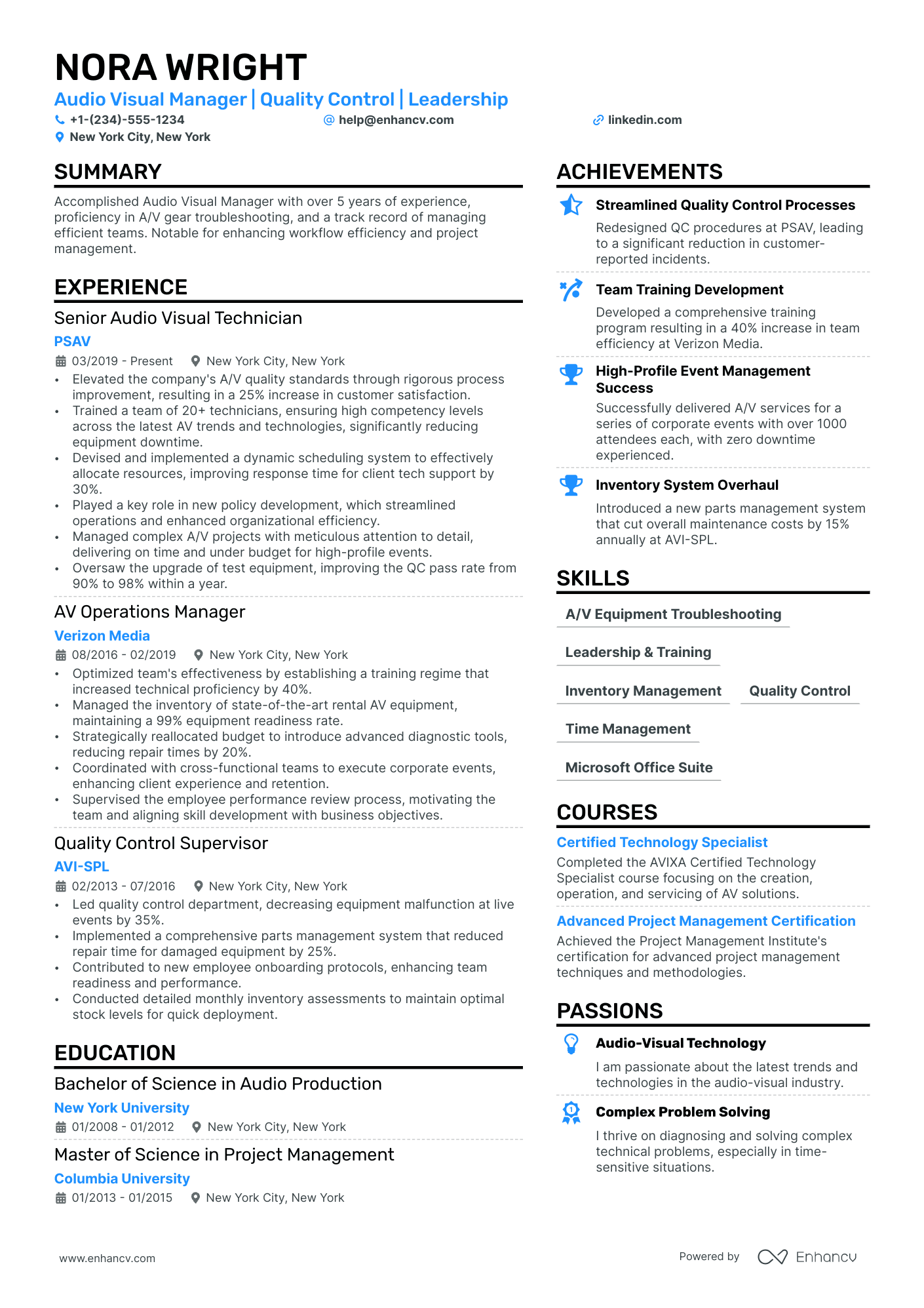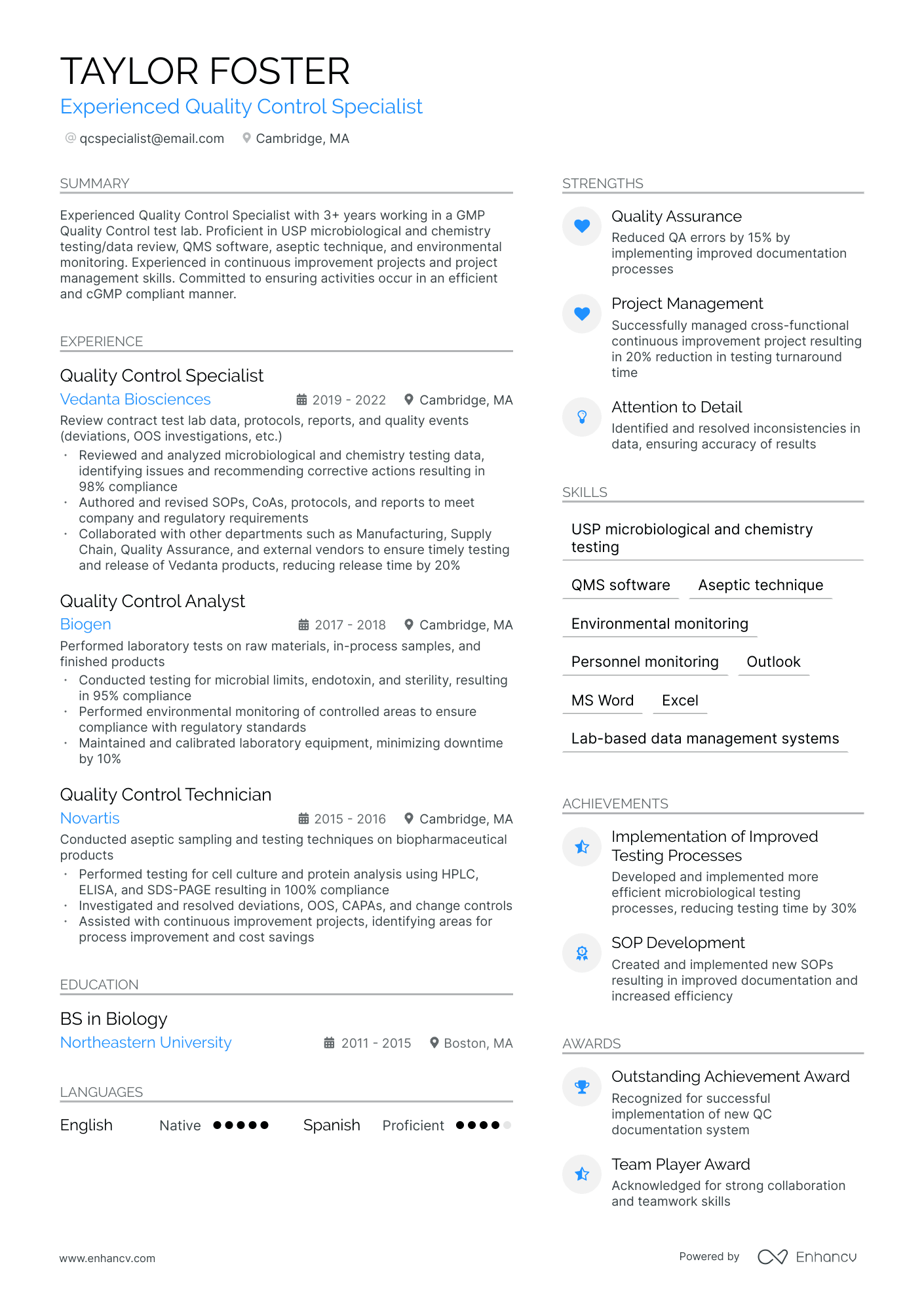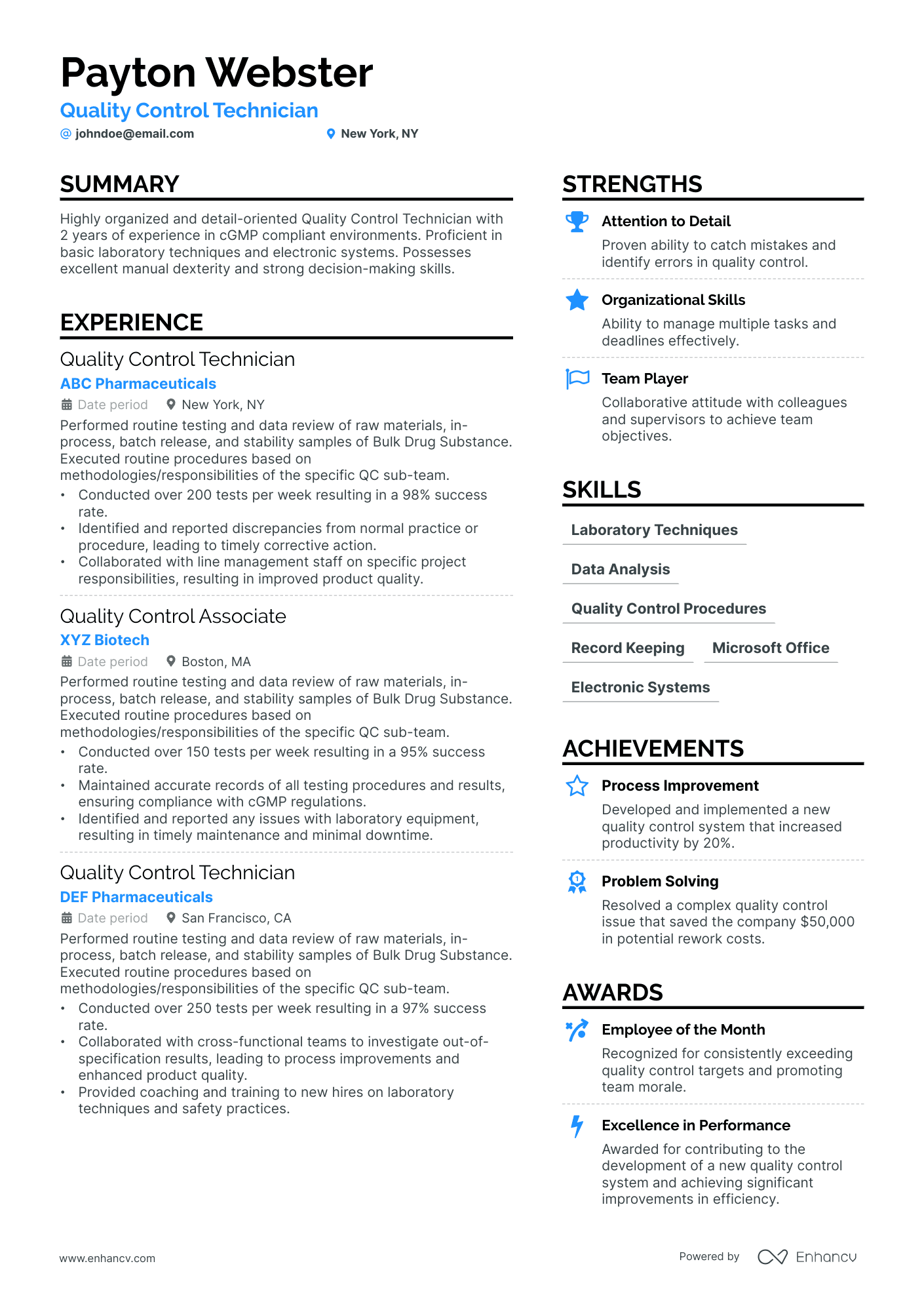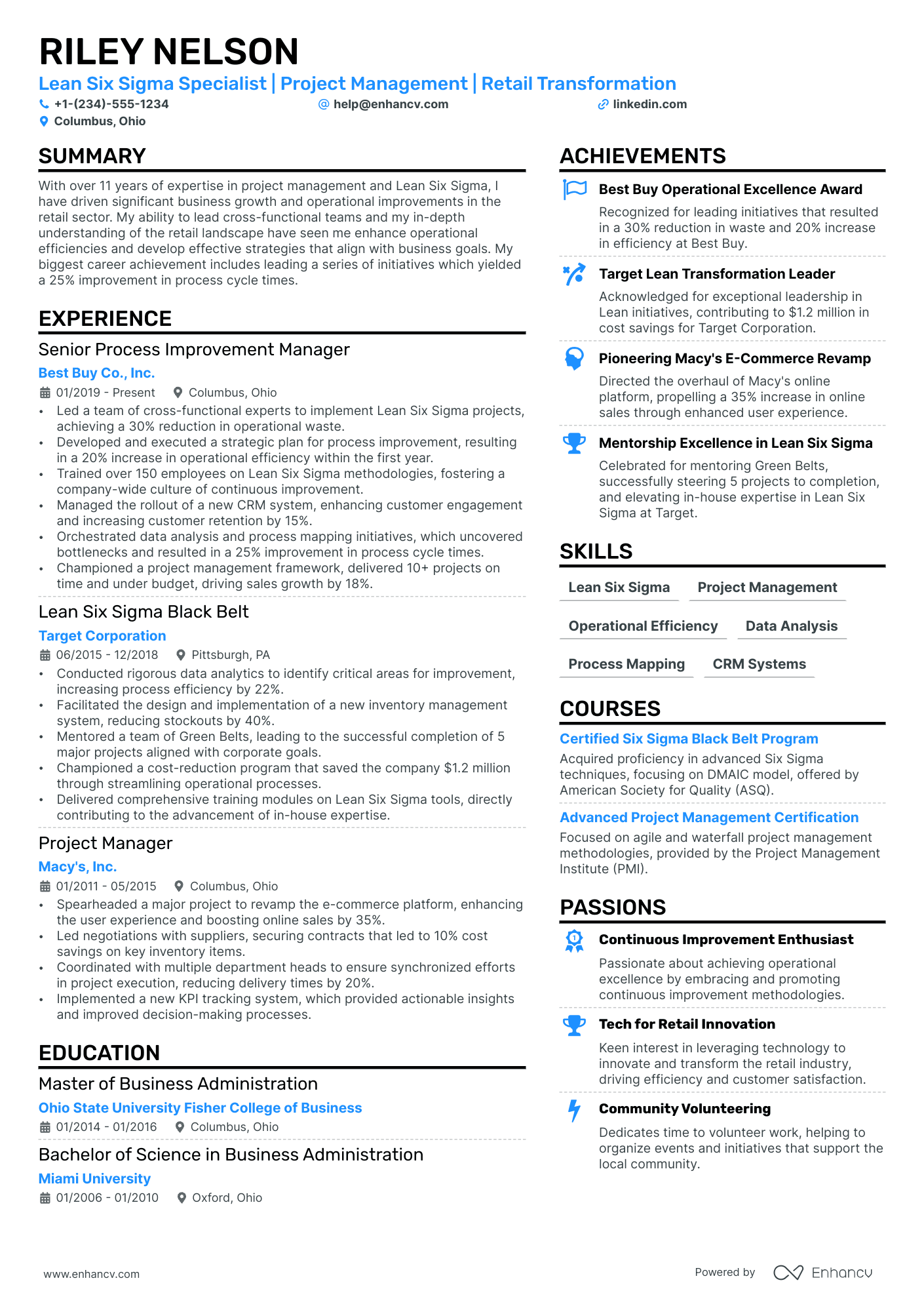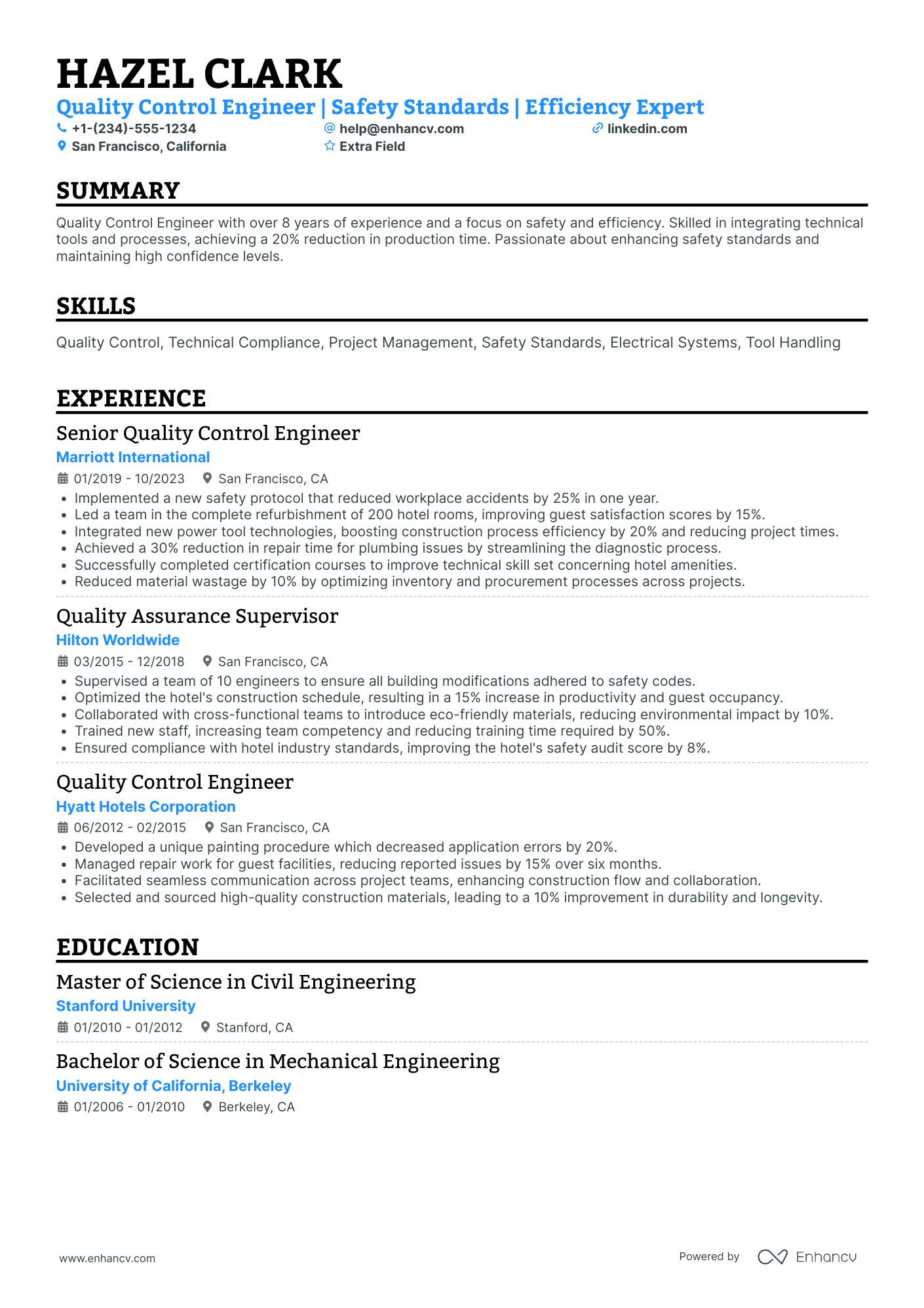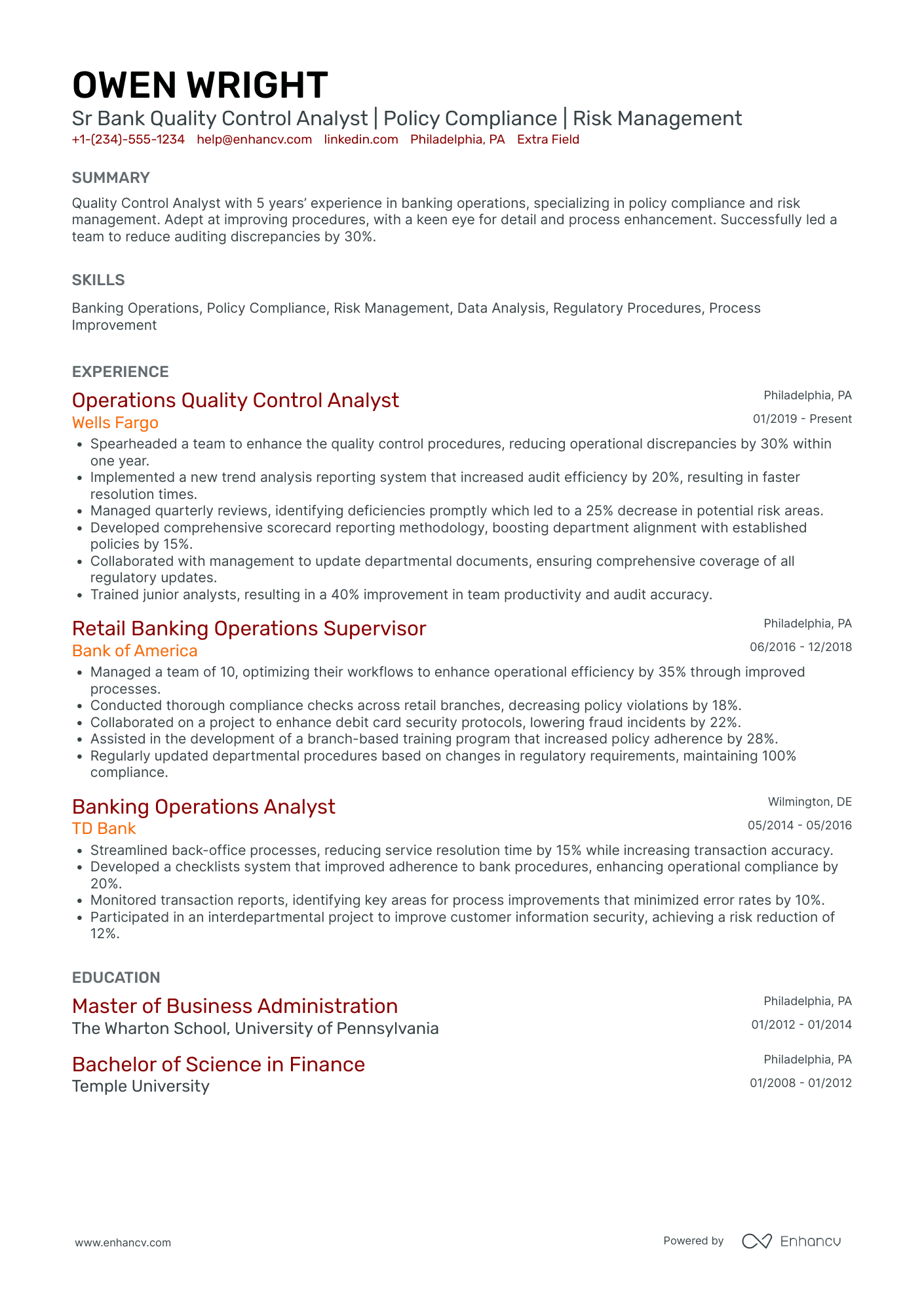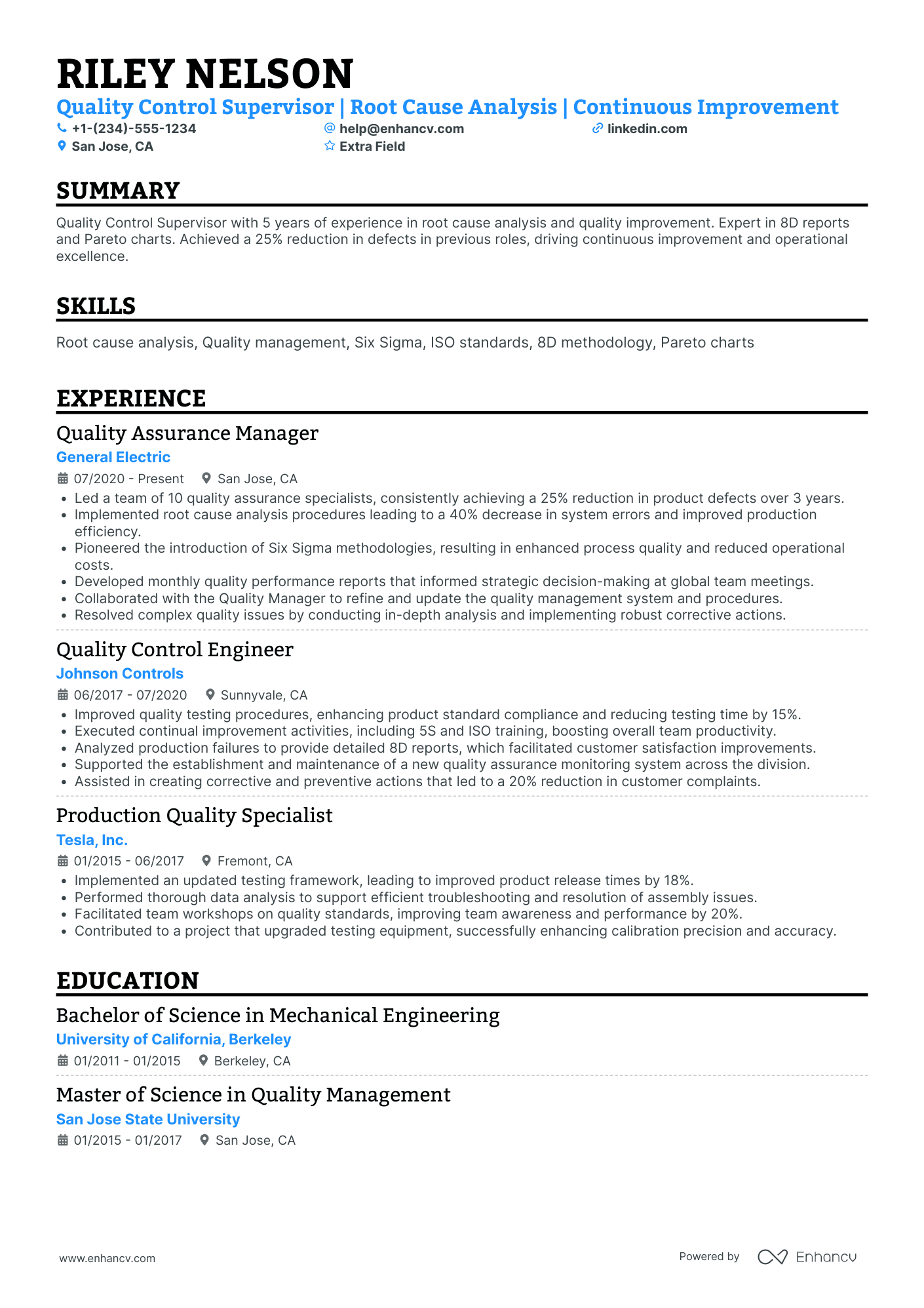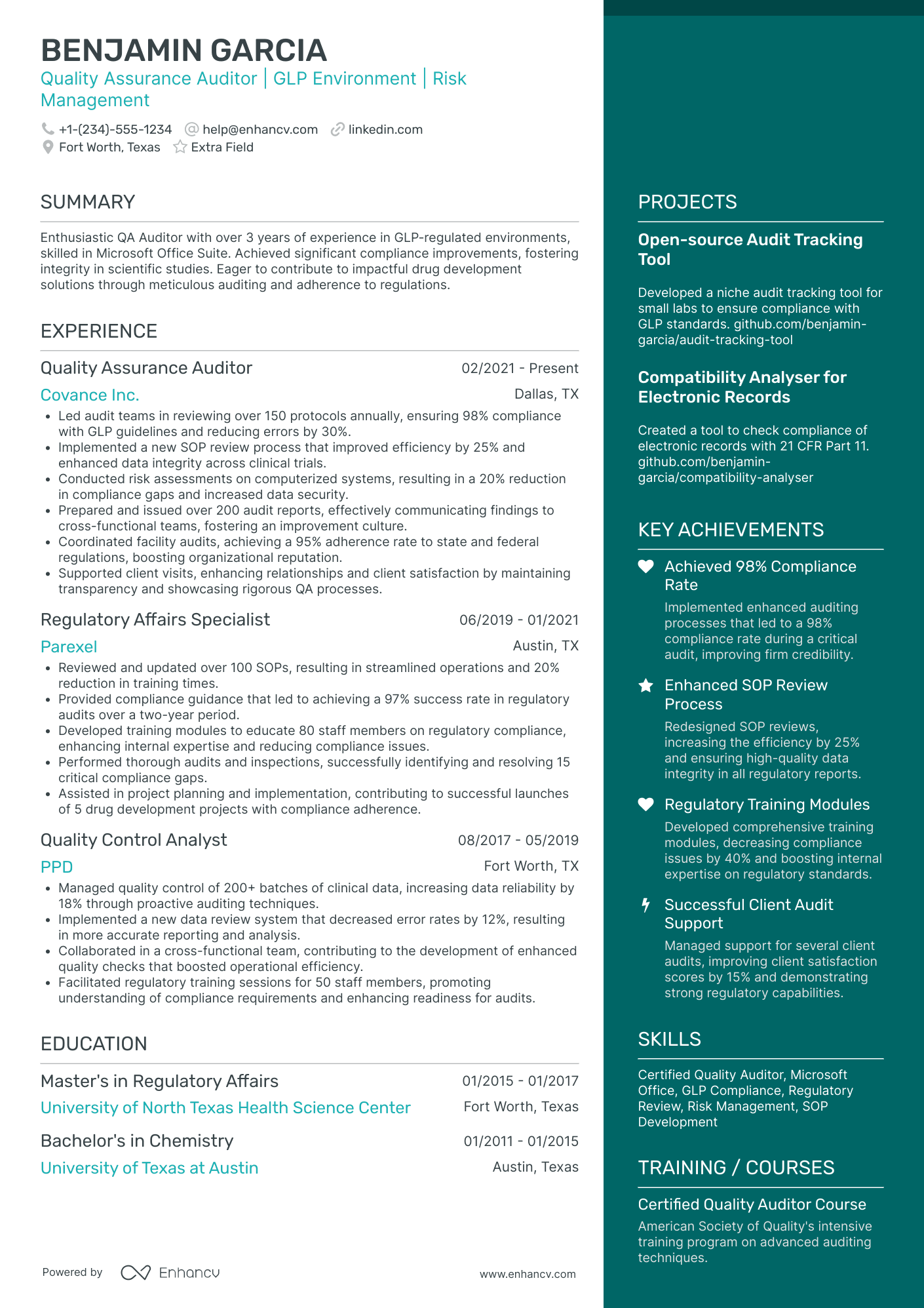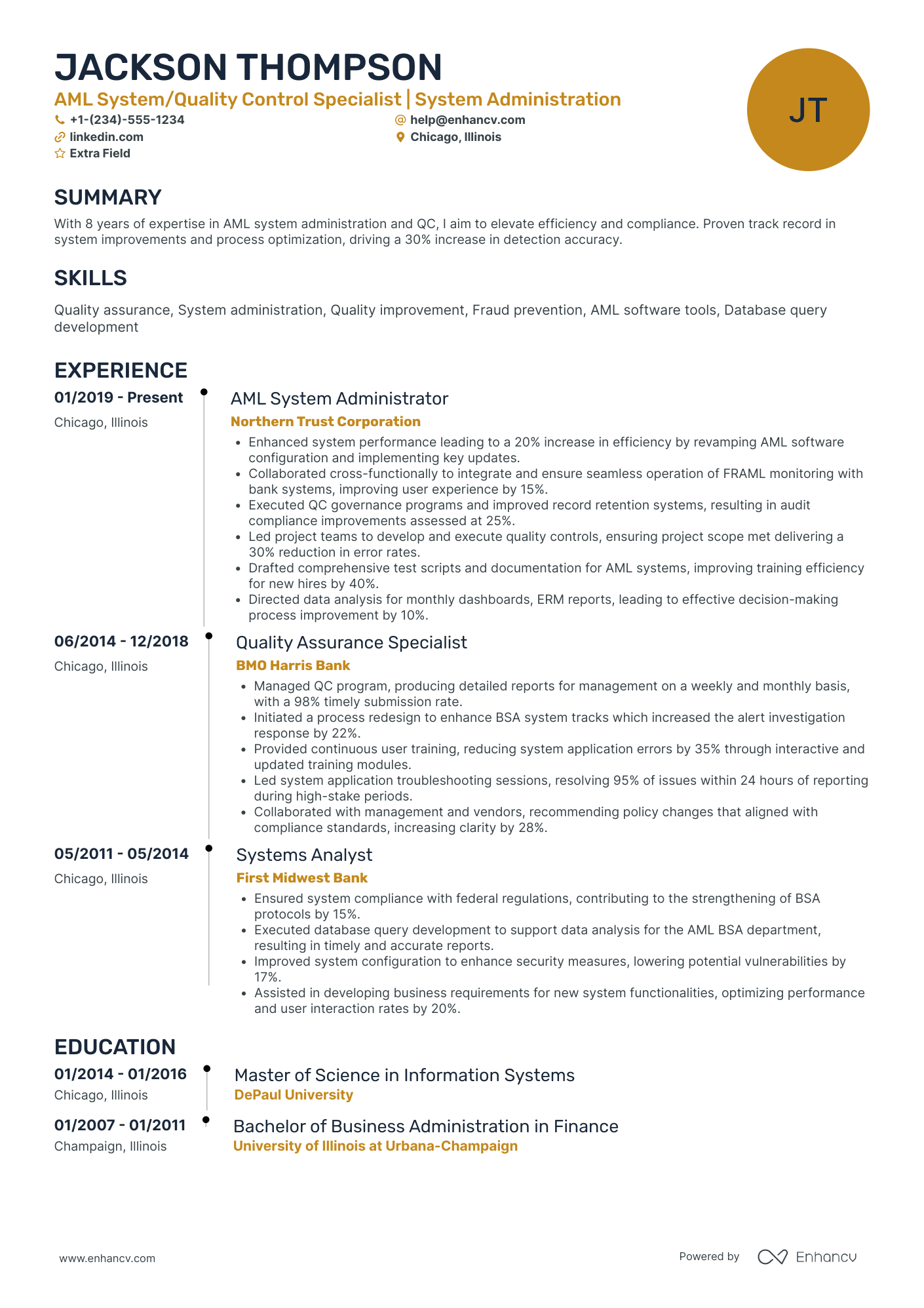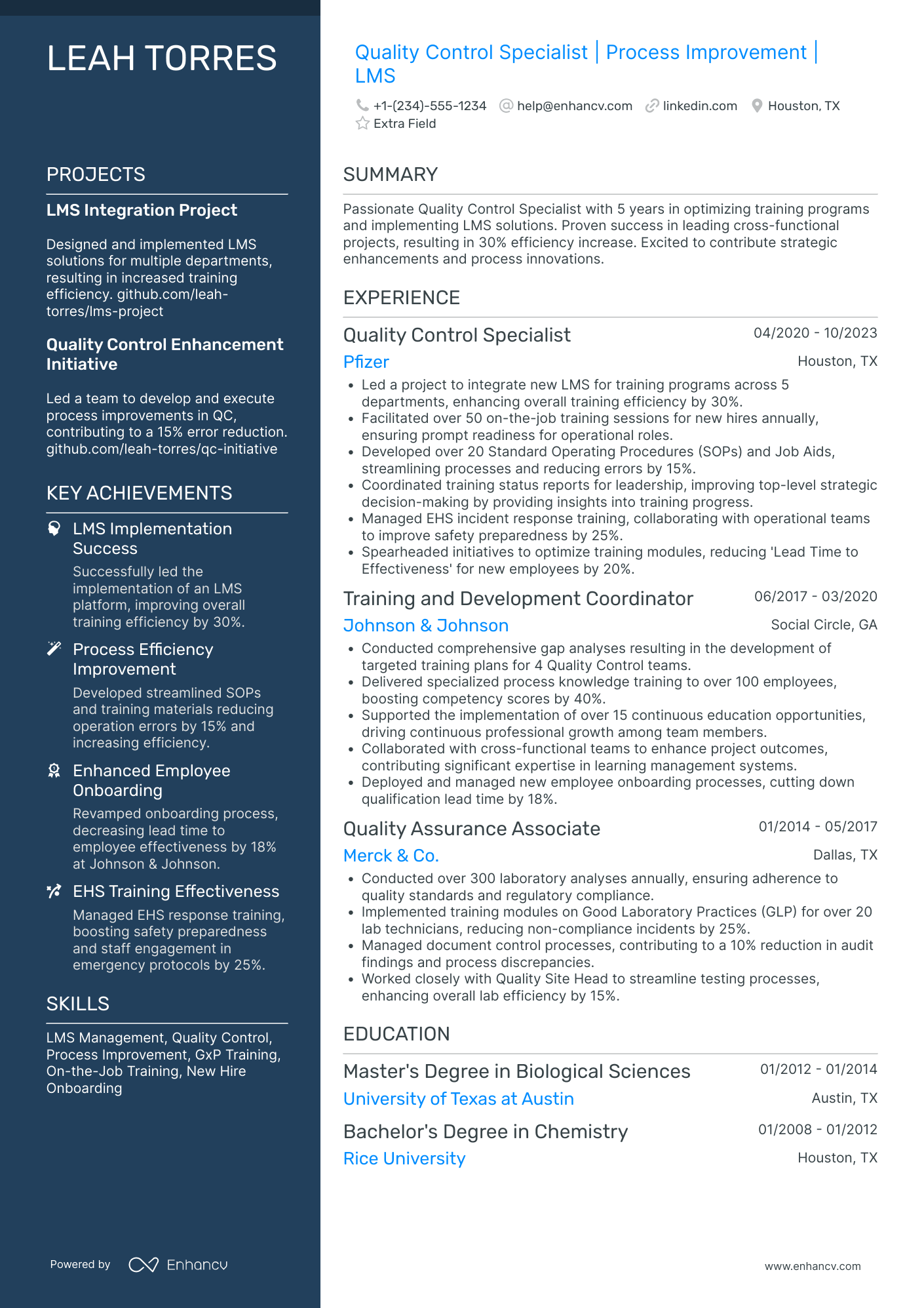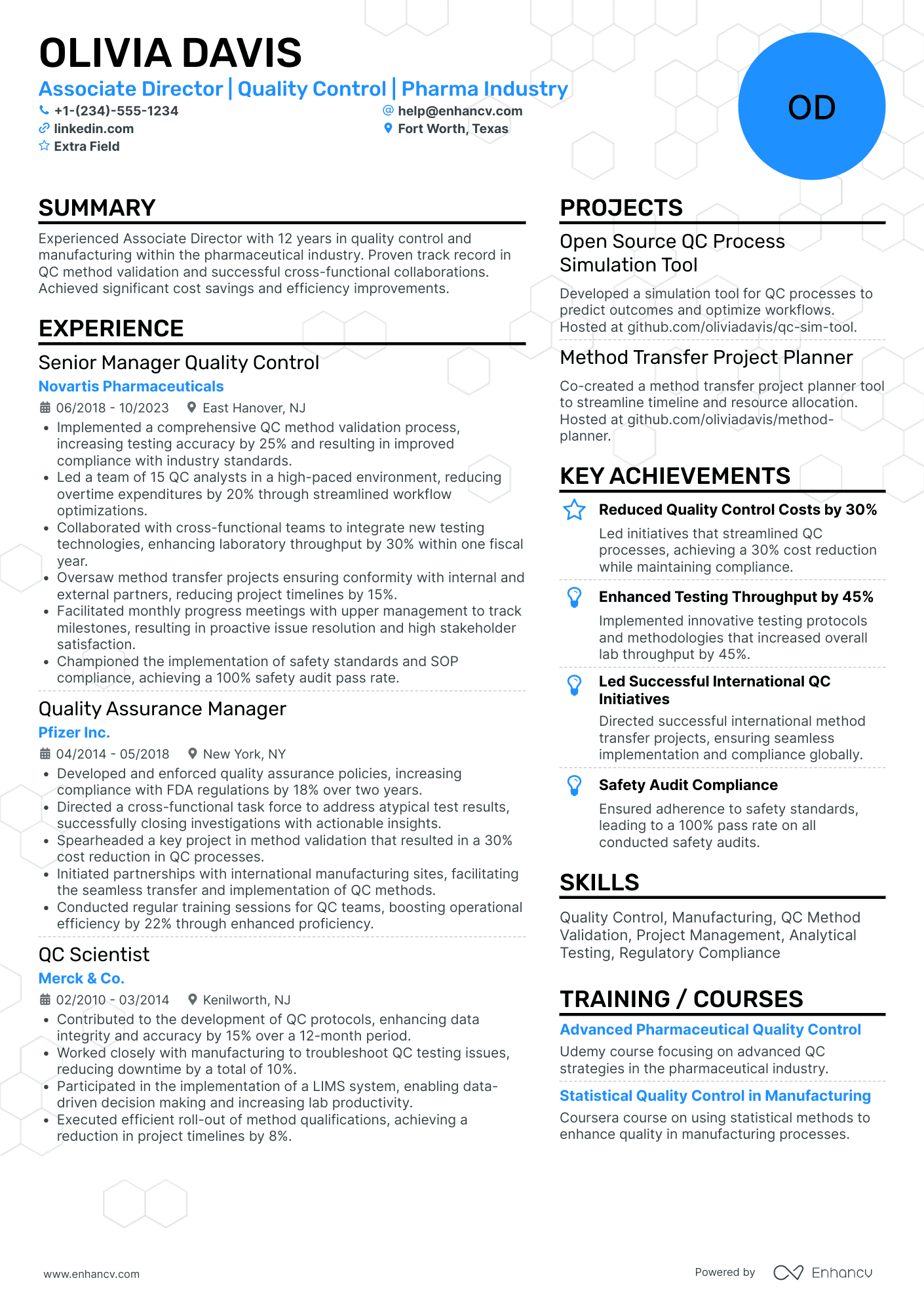Taking a quality control role is like being the detective of the industry world, always on the lookout to spot and fix problems. This job changes a lot depending on where you work, but one thing stays the same: it's all about keeping things up to standards. Recent studies show just how important this is. In 2020, despite the economy growing, pollution has drastically decreased thanks to effective quality control in environmental management. So, when you're writing your resume, think of yourself as the guardian of quality—making sure everything from the air we breathe to the products we use is safe and up to par.
Key takeaways
- The reverse-chronological format provides a clear overview of your career progression in quality control.
- Incorporating a clean design with a hint of color and an eye-catching font can significantly enhance your quality control resume's appeal to potential employers.
- Emphasize your experience section with measurable accomplishments and concrete results to quickly capture the attention of hiring managers.
- Create a dedicated section for your specific quality control skills, and integrate your interpersonal skills throughout your resume.
- A relevant educational background in quality assurance or a related field is highly valuable in quality control and will always be appreciated.
Let's take a look at a quality control resume example.
Quality control resume sample
Need a template to kickstart your resume writing? Use the one below. Or, try our Enhancv resume builder. It’s intuitive and only takes minutes.
Michael Thompson
quality control Inspector
michael.thompson@example.com | @LinkedIn | San Francisco, CA
Summary
Detail-oriented quality control Inspector with 7 years of experience ensuring the highest standards of product quality and safety. Proficient in using various measuring tools and techniques to inspect components and finished products. Adept at monitoring production cycles, examining raw materials, and preventing manufacturing errors.
Experience
quality control Inspector
General Electric, San Francisco, CA
January 2018 – Present
- Conduct final confirmation of product quality for consumer goods.
- Utilize measuring tools to ensure components meet standard variances.
- Examine raw materials for purity and compliance with internal standards.
- Monitor production-line cycles and report findings to superiors.
- Implement corrective actions to prevent manufacturing errors.
Quality Assurance Technician
Apple Inc., Cupertino, CA
June 2015 – December 2017
- Assisted in quality control processes for manufacturing operations.
- Performed tests on components and materials to ensure quality standards.
- Documented inspection results and prepared reports for management.
- Collaborated with production teams to resolve quality issues.
Education
Bachelor of Science in Industrial Engineering
University of California, Berkeley
Graduated: 2015
Certifications
- Certified Quality Inspector (CQI)
- Six Sigma Green Belt
Skills
- Quality control
- Inspection Techniques
- Measurement Tools
- Production Monitoring
- Report Preparation
- Error Prevention
- Compliance Standards
- Team Collaboration
Languages
- English (Fluent)
- Spanish (Proficient)
After reviewing the sample, it's crucial to understand the ideal format that makes your resume stand out.
How to format a quality control resume
The right resume format will prove your attention to detail and bring important information to focus. Choose a clear, organized template to highlight your quality control expertise. Hiring managers will appreciate a structured layout that abides to professional standards.
Resume format
Go with the classic, and choose the reverse-chronological format. It’s so widely recognized and comprehensive, and you can’t go wrong with it. This format shows perseverance and consistency.
Resume designs
- Length: Recruiters don’t have much time, so keep your resume concise. A 1-page resume is usually enough to give an overview of your achievements.
- Margins: Don’t cramp up your resume. Keep your margins between 0.5” and 1”, preferably closer to the upper end of that range.
- Columns: Two-column designs save space and are a great way to include more information without making your resume overly long.
- Colors and fonts: Don’t shy away from colors. They can boost the professional outlook of your resume. Opt for elegant colors like dark gray, blue, or green. Pair them with a modern font like Rubik, Calibri, or Lato to make your resume stand out.
Contact information
Hiring managers expect to see your contact information, including your name, job title, and email address, on your resume header. Photos are generally not needed but always consult with your desired job ad.
Align your resume with the market’s standards – Canadian resumes may have unique layout guidelines.
PRO TIP
Applicant Tracking Systems often cause unnecessary fear. Contrary to popular belief, our tests showed that fonts, colors, columns, and resume length don’t affect parsing. Focus on matching job description language and formatting details like dates and bullet symbols as those may affect your application. However, not all companies use ATS, so avoid keyword stuffing and keep your resume clear and readable.
File formatting
Ensure all your resume elements stay in place with the PDF format. Use a clear naming convention, like FirstName_LastName_JobTitle. Make sure your resume has no typos, serving as proof of your detail-oriented personality!
Additionally, you can add a personal website or your LinkedIn profile in your header.
Top sections on a resume
These are the sections your resume shouldn’t go without:
- Contact information
- Work history
- Skills section
- Education details
- Personal statement
We already discussed your contact information, and we’ve dedicated a section on each of them below.
When it comes to your resume, leave the quality check with us. In fact, we’ve got 16 checks to ensure your resume is top-notch!
Is your resume good enough?
Drop your resume here or choose a file. PDF & DOCX only. Max 2MB file size.
With the right format in mind, let’s delve into presenting your professional experience.
How to write your quality control resume experience
Writing a compelling experience section for a quality control position requires showcasing your proficiency in maintaining standards and ensuring product excellence.
You can build your experience section by thinking of two main points:
- What specific duties and qualifications do you have, depending on the industry you work in (IT, manufacturing, biotech).
- How your specific work experience can demonstrate your attention to detail, analytical skills, and ability to adhere to strict industry standards—qualities that are integral to the QC role.
When crafting your experience section, follow these steps:
- Start with your most recent and relevant experience first.
- Include job titles, company names, locations, and dates of employment for each position you’ve held.
- Provide examples of how you identified and resolved issues in the production process, improving product quality and customer satisfaction.
- Mention projects where you collaborated with cross-functional teams to maintain quality standards, reflecting your ability to work well in team environments.
Quality control Inspector
Job Overview
The primary duty of the quality control Inspector is to provide support to commercial manufacturing lines ensuring delivery of the highest quality product to the customer while supporting continuous improvement projects and quality initiatives. This is a dynamic support role requiring cross-functional collaboration with production, manufacturing, and quality team members. This role includes responsibility for providing day-to-day quality support for manufacturing, including the processing of non-conforming product (identification, documentation, segregation evaluation and disposition) and responding to quality signals.
Main Responsibilities
- Perform routine Incoming quality control (IQC), In -Process quality control (IPQC), and Final quality control (FQC) testing / inspection and recording of test results.
- Update databases and spreadsheets used to track, monitor, and report department activities.
- Use the inventory and traceability management systems to transact material.
- Review and update of QA Documentation.
- Compliance to all QC and relevant plant wide procedures and practices.
- Collect and compile statistical quality data.
- Provide excellent service to all internal and external customers of the QC Laboratory / QC department.
- Communicate concerns about the work process regarding environmental impact, health, or safety issues to their supervisor.
- Excellent attention to detail.
Skills and Qualifications
- Associate degree in technical discipline (or equivalent)
- 2 years of quality or manufacturing experience in the medical device industry
- Good interpersonal skills and organizational skills
- Able to read, understand, and communicate procedural requirements
- Highly Proficiency with Microsoft desktop environment: Windows and Office 365
- Familiarity with product/component inspection and testing and Manufacturing Execution System (MES)
- Fluent in English language, written and spoken
Tailor your resume to the job posting
The quality control position can seem abstract to those outside the industry you work for. After all, it has its own specifics depending on the field you specialize in. Hiring managers will know exactly what they’re looking for, so your best bet is tailoring your resume to the job posting.
- •Conducted over 3000 IQC, IPQC, and FQC inspections and tests annually, ensuring product compliance with FDA standards and leading to a 15% reduction in customer complaints.
- •Enhanced QC tracking and reporting by updating and maintaining QA databases, which streamlined the monitoring process and reduced report generation time by 25%.
- •Managed material traceability and inventory transactions through MES, handling over $2 million worth of products annually and improving material utilization by 10%.
Here’s why this experience section works:
- The bullets directly address key responsibilities and skills listed in the job description, such as conducting IQC, IPQC, and FQC inspections, and managing QA documentation and databases.
- The experience section demonstrates familiarity with industry-specific tools and practices, highlighting expertise in the medical device industry which is critical for the job.
- The clear formatting and specific details provided make it easy for hiring managers to see the candidate's qualifications and experience relevant to the role at hand.
Describing your experience is essential, but quantifying your achievements will make a stronger impact.
How to quantify your experience on a resume
To further enhance your resume, quantify your accomplishments with precise data wherever possible. This could include the percentage of defect reduction achieved under your supervision or the number of compliance audits successfully passed.
Use active language and strong verbs such as “implemented,” “enhanced,” “reduced,” or “led” to convey your direct involvement and impact. Including specific quality control tools or software you are proficient in can also help set you apart from other candidates.
By presenting a clear narrative of how your efforts have directly benefited your previous employers, you create a compelling case for why you would be a valuable asset in a new QC role.
We’ve provided some examples:
- Include the number of successful audits you have conducted, which shows your efficiency and ability to maintain high-quality standards.
- Share the percentage of cost reductions achieved by you through quality control measures, demonstrating your commitment to the financial health of a business.
- Mention the number of quality control methods you are familiar with, proving versatile technical knowledge.
- List the number of compliance certificates you have helped the business obtain, indicating your ability to meet industry regulations.
- Reveal the figure of production errors you have successfully reduced, showing your impact on improving operational efficiency.
You can write a compelling resume regardless of your experience. Keep reading for tips on entry-level resumes.
How do i write a quality control resume with no experience
QC entry-level jobs are usually quite structured. They require you to follow an established protocol. This makes them available even to those without much experience. To do the job well, you need to be able to follow instructions, adhere to procedures, and be attentive to detail. Here’s what to include on your quality control resume if you’re just starting out:
- A BS degree in Quality Assurance, Applied Mathematics, Operations Management or a related field to grasp market dynamics and operations.
- Internships or part-time roles in quality control or quality assurance provide practical industry insights.
- Consider additional training or certifications you can list to enhance your professional profile.
- Highlight transferable skills such as communication, strategic thinking, and creativity, valuable in quality control roles.
Additionally, a resume objective is your go-to choice if you’re just starting out. Keep your objective shorter – 1-3 sentences, and try to hook recruiters by focusing on your willingness to learn new things and progress in your career. Here’s an example:
Beyond experience, showcasing both hard and soft skills is key to demonstrating your qualifications.
Quality control skills on your resume
The skills section of your resume is a crucial showcase of your capabilities. Structure it effectively to highlight your qualifications to potential employers. Categorize your skills into “hard” and “soft” categories.
Hard skills should include specific competencies relevant to quality control, like proficiency in specific software or testing methodologies. Consider creating a dedicated section for these skills to ensure they are immediately noticeable and easy to read. Take your pick from our suggestions:
Best hard skills for your quality control resume
- Quality control analysis
- Statistical process control
- ISO 9001 standard
- ISO 14000 standard
- Certified Quality Engineer (CQE)
- Certified Quality Auditor (CQA)
- Six Sigma Certification
- Lean Manufacturing Principles
- Root cause analysis
- Corrective and preventive action (CAPA)
- Analytical testing and equipment
- Microsoft Office Suite
- Project management software
- AutoCAD
- GD&T proficiency
- MATLab
- PLC programming
- SAP software
- Minitab software
- Failure mode and effects analysis (FMEA)
As concrete and technology-bound as quality control position is, it still requires people skills—just like every job. People skills, or soft skills, help you maintain positive relationships with team members and manage complex situations effectively. Rather than isolating these skills in a separate section on your resume, it's more impactful to integrate them with specific examples throughout your work experience. Take a look at this list:
Best soft skills for your quality control resume
- Attention to detail
- Problem-solving
- Communication
- Time management
- Organizational skills
- Critical thinking
- Teamwork
- Adaptability
- Decision-making
- Patience
- Stress management
- Leadership
- Dedication
- Persistence
- Initiative
- Creativity
- Confidence
- Empathy
- Negotiation
- Accountability
Next, we will cover how to list your educational background and any relevant certifications.
How to list your certifications and education on your resume
To advance in quality control, education is just as important as experience. Although you can land some entry-level positions with a high school diploma, a higher degree is always beneficial. It shows consistency, seriousness, and discipline—qualities every employer would like to see.
The degree you choose will depend on the industry you work in. For example, a quality control chemist in pharmaceuticals might list a chemistry degree and GMP certification on their resume to meet strict regulatory standards. Meanwhile, a quality control technician in manufacturing could highlight a degree in industrial engineering and Six Sigma certification, emphasizing their process improvement skills.
Don’t miss out on these education section features:
- A clearly outlined degree and major.
- Your educational institution.
- The year you graduated (the month is not required).
- Courses related to quality assurance or quality control.
- If you’ve been on the Dean's List, graduated Cum Laude, or received a scholarship, underline that on your application.
Here’s a well-written education entry. By the way, it targets the job posting above:
- •Focused coursework on quality assurance protocols and statistical analysis for manufacturing environments.
- •Completed project on non-conforming product management systems, aligning with real-world quality control practices.
- •Trained in using Manufacturing Execution Systems (MES) and familiar with regulatory compliance for medical devices.
You can see why it did well:
- The degree mentioned is directly relevant to the job role, specifically tailored for someone entering a quality control position in the medical device sector.
- It mentions specific coursework and projects that align with the responsibilities of the job, such as quality assurance protocols and handling non-conforming products.
- Including a high GPA emphasizes academic excellence and a strong understanding of the subject matter, which is beneficial for technical roles.
Training and certifications are essential for demonstrating expertise in the quality control field. A dedicated certifications section on your resume offers concrete evidence that you are committed to excelling in your profession. You can include one of the certificates we've listed below, but it's best to tailor your selection to the requirements specified in the job advertisement you're targeting.
Best certifications for your quality control resume
Having covered education and certifications, let’s move on to crafting a powerful resume summary.
How to write your quality control resume summary
Your personal profile contains important information about what you’ve achieved and what you seek in your future career. If you’ve got more than 3 years of experience, opt for including a resume summary in your application.
A top-notch summary includes:
- 3 – 5 sentences describing your professional journey, achievements, and qualities.
- Measurable experience that holds the recruiters’ attention immediately.
- Relevant education or additional training that adds value.
- Most importantly, highlight what you want to achieve in the future and what you think you can bring to the company.
Here’s the summary targeting the quality control job description above.
This summary concisely outlines the quality control Inspector's key duties, including routine testing, documentation, and compliance with safety and quality protocols. It emphasizes collaboration and continuous improvement, essential for maintaining high-quality standards in manufacturing.
Finally, we’ll discuss additional sections that can enhance your resume and make it more comprehensive.
Optimize your resume summary and objective for ATS
Drop your resume here or choose a file.
PDF & DOCX only. Max 2MB file size.
Additional sections for a quality control resume
Using additional resume sections can boost your application. They show things that can’t fit into the traditional categories but reveal more about your character.
Considering the QC diversity of skills, include some of the following sections:
- Language skills
- Professional achievements
- Professional publications
- Notable projects
- Hobbies and interests
- Volunteer work
- Cover letter
In conclusion
Crafting an exceptional QC resume requires precise focus on structure, presentation, and content. Use the curated tips in this resume guide to effectively showcase your skills and make a memorable impact on potential employers.
Quality Control resume examples
By Experience
By Role
